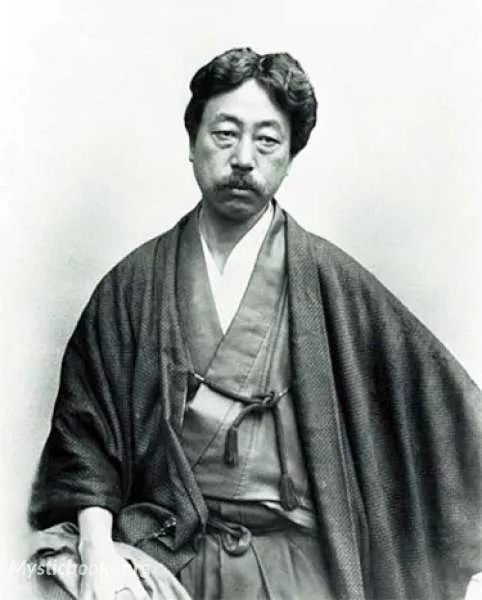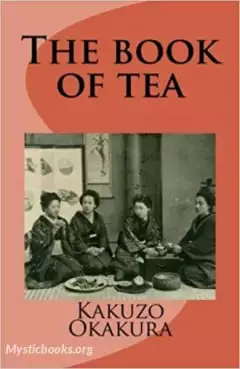
Timeline
Title
Country/Nationality
Okakura Kakuzo
Okakura Kakuzō was a Japanese scholar who contributed to the development of arts in Japan. Outside Japan, he is chiefly remembered today as the author of The Book of Tea.
The second son of Okakura Kan'emon, a former Fukui Domain treasurer turned silk merchant, and Kan'emon's second wife, Kakuzō was named for the corner warehouse (角蔵) in which he was born, but later changed the spelling of his name to different Kanji meaning "awakened boy" (覚三).
Okakura learned English while attending a school operated by Christian missionary, Dr. Curtis Hepburn. At 15, he entered the newly renamed Tokyo Imperial University, where he first met and studied under Harvard-educated professor Ernest Fenollosa.
In 1889, Okakura co-founded the periodical Kokka. In 1887, he was one of the principal founders of the Tokyo School of Fine Arts (東京美術学校 Tōkyō Bijutsu Gakkō), and a year later became its head, although he was later ousted from the school in an administrative struggle. Later, he also founded the Japan Art Institute with Hashimoto Gahō and Yokoyama Taikan. He was invited by William Sturgis Bigelow to the Museum of Fine Arts, Boston in 1904 and became the first head of the Asian art division in 1910.
Okakura was a high-profile urbanite who had an international sense of self. In the Meiji period he was the first dean of the Tokyo Fine Arts School (later merged with the Tokyo Music School to form the current Tokyo University of the Arts). He wrote all of his main works in English. Okakura researched Japan's traditional art and traveled to Europe, the United States, China and India. He emphasised the importance to the modern world of Asian culture, attempting to bring its influence to realms of art and literature that, in his day, were largely dominated by Western culture.
His 1903 book on Asian artistic and cultural history, The Ideals of the East with Special Reference to the Art of Japan, published on the eve of the Russo-Japanese War, is famous for its opening paragraph in which he sees a spiritual unity throughout Asia, which distinguishes it from the West:
Asia is one. The Himalayas divide, only to accentuate, two mighty civilisations, the Chinese with its communism of Confucius, and the Indian with its individualism of the Vedas. But not even the snowy barriers can interrupt for one moment that broad expanse of love for the Ultimate and Universal, which is the common thought-inheritance of every Asiatic race, enabling them to produce all the great religions of the world, and distinguishing them from those maritime peoples of the Mediterranean and the Baltic, who love to dwell on the Particular, and to search out the means, not the end, of life.
In his subsequent book, The Awakening of Japan, published in 1904, he argued that "the glory of the West is the humiliation of Asia." This was an early expression of Pan-Asianism. In this book Okakura also noted that Japan's rapid modernization was not universally applauded in Asia: ″We have become so eager to identify ourselves with European civilization instead of Asiatic that our continental neighbors regard us as renegades—nay, even as an embodiment of the White Disaster itself."
In his The Book of Tea, which was written in English in 1906, he states:
It (Teaism) insulates purity and harmony, the mystery of mutual charity, the romanticism of the social order. It is essentially a worship of the Imperfect, as it is a tender attempt to accomplish something possible in this impossible thing we know as life.
Okakura's health deteriorated in his later years. "My ailment the doctors say is the usual complaint of the twentieth century—Bright's disease," he wrote a friend in June 1913. "I have eaten things in various parts of the globe—too varied for the hereditary notions of my stomach and kidneys. However I am getting well again and I am thinking of going to China in September." In August, 1913, "Kakuzo insisted on going to his mountain villa in Akakura, and finally his wife, daughter and his sister took him there by train. For a week or so, Kakuzo felt a little better and was able to talk with people, but on August 25, he had a heart attack and spent several days in great pain. Surrounded by his family, relatives and his disciples, he passed away on September 2.
Books by Okakura Kakuzo

The Book of Tea
The Book of Tea is as much about philosophy, religion and art as it is about a drink made with dried leaves in boiling water. It traces the development of tea into teaism. The author’s first paragraph summarizes the whole book: